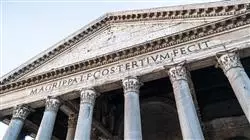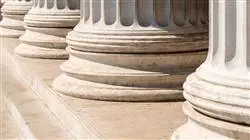University certificate
The world's largest faculty of education”
Introduction to the Program
Ad discendum quod opus est nulla mihi aetas sera videri potest (There is no age too old to learn what I need to learn), and this Professional master’s degree is the best opportunity to do so”

Classical Culture is fundamental in the field of education because ancient Greece and Rome were the cradle of Western civilization. Thus, understanding what happens today is inconceivable without first knowing what happened during the first millennium B.C. and how these two great states gave rise to a rich history in which, if we delve deeper, it is possible to establish similarities with current times. However, this is an area that sometimes does not generate interest in students who see in it, as in Latin, an obsolete culture.
To prove that this is not the case and that it is possible to teach these subjects in a dynamic and entertaining way, TECH and its team of experts in Humanities and History have developed a complete program with which teachers can implement the most innovative teaching strategies in their practice. A Professional master’s degree consisting of 1,500 hours of diverse content, including additional material (detailed videos, research articles, didactic resources, complementary readings, etc.) that graduates will be able to use in their own classes.
Through an extensive historical journey, the syllabus delves into the geographical framework of Greece and Rome, classical art, Greco-Roman religion, and the politics and social structures of the time. Once this period is over, the program focuses on Latin and the keys to its mastery, from the translation of simple to complex sentences, with special emphasis on the syntactic guidelines to carry it out properly. All this in a 100% online format and through a unique academic experience with which teachers will no doubt take a step further in their commitment to a more innovative methodological education.
You will work comprehensively on the translation of simple and compound sentences in Latin, pointing out exceptions and specific syntactic constructions”
This Professional master’s degree in Teaching Latin and Classical Culture contains the most complete and up-to-date program on the market. The most important features include:
- Practical cases presented by experts in Humanities, Art History and Teaching
- The graphic, schematic, and practical contents with which they are created, provide practical information on the disciplines that are essential for professional practice
- Practical exercises where self-assessment can be used to improve learning
- Its special emphasis on innovative methodologies
- Theoretical lessons, questions to the expert, debate forums on controversial topics, and individual reflection assignments
- Content that is accessible from any fixed or portable device with an Internet connection
The best program available on the academic market to implement the most innovative and effective language teaching methods into your daily practice”
The program’s teaching staff includes professionals from the sector who contribute their work experience to this training program, as well as renowned specialists from leading societies and prestigious universities.
The multimedia content, developed with the latest educational technology, will provide the professional with situated and contextual learning, i.e., a simulated environment that will provide immersive specialization programmed to learn in real situations.
This program is designed around Problem-Based Learning, whereby the professional must try to solve the different professional practice situations that arise throughout the program. For this purpose, the student will be assisted by an innovative interactive video system created by renowned and experienced experts.
You will learn to use the Flipped Classroom method using the tools to apply it on a daily basis in your classes"

Thanks to this Professional master’s degree, you will work on perfecting your communication strategies, so you can get the attention of your students and engage them in your classes"
Why study at TECH?
TECH is the world’s largest online university. With an impressive catalog of more than 14,000 university programs available in 11 languages, it is positioned as a leader in employability, with a 99% job placement rate. In addition, it relies on an enormous faculty of more than 6,000 professors of the highest international renown.

Study at the world's largest online university and guarantee your professional success. The future starts at TECH”
The world’s best online university according to FORBES
The prestigious Forbes magazine, specialized in business and finance, has highlighted TECH as “the world's best online university” This is what they have recently stated in an article in their digital edition in which they echo the success story of this institution, “thanks to the academic offer it provides, the selection of its teaching staff, and an innovative learning method aimed at educating the professionals of the future”
A revolutionary study method, a cutting-edge faculty and a practical focus: the key to TECH's success.
The most complete study plans on the university scene
TECH offers the most complete study plans on the university scene, with syllabuses that cover fundamental concepts and, at the same time, the main scientific advances in their specific scientific areas. In addition, these programs are continuously being updated to guarantee students the academic vanguard and the most in-demand professional skills. In this way, the university's qualifications provide its graduates with a significant advantage to propel their careers to success.
TECH offers the most comprehensive and intensive study plans on the current university scene.
A world-class teaching staff
TECH's teaching staff is made up of more than 6,000 professors with the highest international recognition. Professors, researchers and top executives of multinational companies, including Isaiah Covington, performance coach of the Boston Celtics; Magda Romanska, principal investigator at Harvard MetaLAB; Ignacio Wistumba, chairman of the department of translational molecular pathology at MD Anderson Cancer Center; and D.W. Pine, creative director of TIME magazine, among others.
Internationally renowned experts, specialized in different branches of Health, Technology, Communication and Business, form part of the TECH faculty.
A unique learning method
TECH is the first university to use Relearning in all its programs. It is the best online learning methodology, accredited with international teaching quality certifications, provided by prestigious educational agencies. In addition, this disruptive educational model is complemented with the “Case Method”, thereby setting up a unique online teaching strategy. Innovative teaching resources are also implemented, including detailed videos, infographics and interactive summaries.
TECH combines Relearning and the Case Method in all its university programs to guarantee excellent theoretical and practical learning, studying whenever and wherever you want.
The world's largest online university
TECH is the world’s largest online university. We are the largest educational institution, with the best and widest online educational catalog, one hundred percent online and covering the vast majority of areas of knowledge. We offer a large selection of our own degrees and accredited online undergraduate and postgraduate degrees. In total, more than 14,000 university degrees, in eleven different languages, make us the largest educational largest in the world.
TECH has the world's most extensive catalog of academic and official programs, available in more than 11 languages.
Google Premier Partner
The American technology giant has awarded TECH the Google Google Premier Partner badge. This award, which is only available to 3% of the world's companies, highlights the efficient, flexible and tailored experience that this university provides to students. The recognition as a Google Premier Partner not only accredits the maximum rigor, performance and investment in TECH's digital infrastructures, but also places this university as one of the world's leading technology companies.
Google has positioned TECH in the top 3% of the world's most important technology companies by awarding it its Google Premier Partner badge.
The official online university of the NBA
TECH is the official online university of the NBA. Thanks to our agreement with the biggest league in basketball, we offer our students exclusive university programs, as well as a wide variety of educational resources focused on the business of the league and other areas of the sports industry. Each program is made up of a uniquely designed syllabus and features exceptional guest hosts: professionals with a distinguished sports background who will offer their expertise on the most relevant topics.
TECH has been selected by the NBA, the world's top basketball league, as its official online university.
The top-rated university by its students
Students have positioned TECH as the world's top-rated university on the main review websites, with a highest rating of 4.9 out of 5, obtained from more than 1,000 reviews. These results consolidate TECH as the benchmark university institution at an international level, reflecting the excellence and positive impact of its educational model.” reflecting the excellence and positive impact of its educational model.”
TECH is the world’s top-rated university by its students.
Leaders in employability
TECH has managed to become the leading university in employability. 99% of its students obtain jobs in the academic field they have studied, within one year of completing any of the university's programs. A similar number achieve immediate career enhancement. All this thanks to a study methodology that bases its effectiveness on the acquisition of practical skills, which are absolutely necessary for professional development.
99% of TECH graduates find a job within a year of completing their studies.
Professional Master's Degree in Teaching Latin and Classical Culture
The study of Latin and classical culture is a necessity to understand the events that have guided the progress of society in its various dimensions. Based on this, the teaching of this area of knowledge is presented as an excellent opportunity for professional growth. The Professional Master's Degree in Latin and Classical Culture Teaching at TECH Global University consists of 1,500 instructional hours, during which students will have access to an innovative study plan, together with a document bank with the best academic inputs. Likewise, during the Postgraduate Certificate students will obtain different pedagogical tools and techniques, which will facilitate the creation of educational plans with a broad perspective of the substantial elements that make up the languages and the different ancient cultures.
Take a Postgraduate Certificate on teaching Latin and Classical Culture 100% online.
This TECH program is focused not only on providing theoretical input for students, but also on developing technical skills that will allow them to deal with different situations in the classroom. To achieve our goal we have a high quality audiovisual system, which will allow students to develop simulated exercises based on real life. In this way, they will improve their analytical skills, while at the same time they will quickly and easily internalize what is taught in each lesson. Moreover, upon completion of the program, the professional will learn the main facts of the Greek and Roman past, with special emphasis on the Iberian Peninsula.







